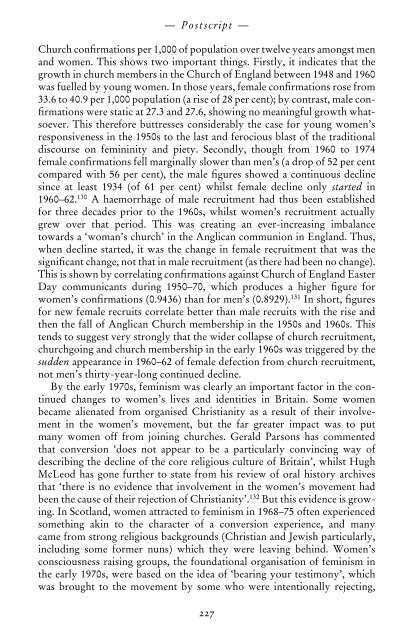The Death of Christian Britain
The Death of Christian Britain
The Death of Christian Britain
You also want an ePaper? Increase the reach of your titles
YUMPU automatically turns print PDFs into web optimized ePapers that Google loves.
— Postscript —<br />
Church confirmations per 1,000 <strong>of</strong> population over twelve years amongst men<br />
and women. This shows two important things. Firstly, it indicates that the<br />
growth in church members in the Church <strong>of</strong> England between 1948 and 1960<br />
was fuelled by young women. In those years, female confirmations rose from<br />
33.6 to 40.9 per 1,000 population (a rise <strong>of</strong> 28 per cent); by contrast, male confirmations<br />
were static at 27.3 and 27.6, showing no meaningful growth whatsoever.<br />
This therefore buttresses considerably the case for young women’s<br />
responsiveness in the 1950s to the last and ferocious blast <strong>of</strong> the traditional<br />
discourse on femininity and piety. Secondly, though from 1960 to 1974<br />
female confirmations fell marginally slower than men’s (a drop <strong>of</strong> 52 per cent<br />
compared with 56 per cent), the male figures showed a continuous decline<br />
since at least 1934 (<strong>of</strong> 61 per cent) whilst female decline only started in<br />
1960–62. 130 A haemorrhage <strong>of</strong> male recruitment had thus been established<br />
for three decades prior to the 1960s, whilst women’s recruitment actually<br />
grew over that period. This was creating an ever-increasing imbalance<br />
towards a ‘woman’s church’ in the Anglican communion in England. Thus,<br />
when decline started, it was the change in female recruitment that was the<br />
significant change, not that in male recruitment (as there had been no change).<br />
This is shown by correlating confirmations against Church <strong>of</strong> England Easter<br />
Day communicants during 1950–70, which produces a higher figure for<br />
women’s confirmations (0.9436) than for men’s (0.8929). 131 In short, figures<br />
for new female recruits correlate better than male recruits with the rise and<br />
then the fall <strong>of</strong> Anglican Church membership in the 1950s and 1960s. This<br />
tends to suggest very strongly that the wider collapse <strong>of</strong> church recruitment,<br />
churchgoing and church membership in the early 1960s was triggered by the<br />
sudden appearance in 1960–62 <strong>of</strong> female defection from church recruitment,<br />
not men’s thirty-year-long continued decline.<br />
By the early 1970s, feminism was clearly an important factor in the continued<br />
changes to women’s lives and identities in <strong>Britain</strong>. Some women<br />
became alienated from organised <strong>Christian</strong>ity as a result <strong>of</strong> their involvement<br />
in the women’s movement, but the far greater impact was to put<br />
many women <strong>of</strong>f from joining churches. Gerald Parsons has commented<br />
that conversion ‘does not appear to be a particularly convincing way <strong>of</strong><br />
describing the decline <strong>of</strong> the core religious culture <strong>of</strong> <strong>Britain</strong>’, whilst Hugh<br />
McLeod has gone further to state from his review <strong>of</strong> oral history archives<br />
that ‘there is no evidence that involvement in the women’s movement had<br />
been the cause <strong>of</strong> their rejection <strong>of</strong> <strong>Christian</strong>ity’. 132 But this evidence is growing.<br />
In Scotland, women attracted to feminism in 1968–75 <strong>of</strong>ten experienced<br />
something akin to the character <strong>of</strong> a conversion experience, and many<br />
came from strong religious backgrounds (<strong>Christian</strong> and Jewish particularly,<br />
including some former nuns) which they were leaving behind. Women’s<br />
consciousness raising groups, the foundational organisation <strong>of</strong> feminism in<br />
the early 1970s, were based on the idea <strong>of</strong> ‘bearing your testimony’, which<br />
was brought to the movement by some who were intentionally rejecting,<br />
227








